GPHL 110 - Plato's Republic: Morality at Individual and Community
VerifiedAdded on 2023/06/03
|5
|909
|160
Essay
AI Summary
This essay delves into Plato's perspective on morality, as presented in 'The Republic,' examining how it applies to both individuals and communities. Plato posits that a moral person is rational and driven by the 'good,' possessing an innate sense of morality that leads to just actions and ultimate happiness. He distinguishes between apparent and actual self-interest, arguing that true morality aligns with genuine self-interest. Justice and morality are essential for the common good and societal harmony. The essay supports Plato's view that a moral person embodies a harmonious soul, contributing to a harmonious society. Find more resources like this, including past papers and solved assignments, on Desklib.
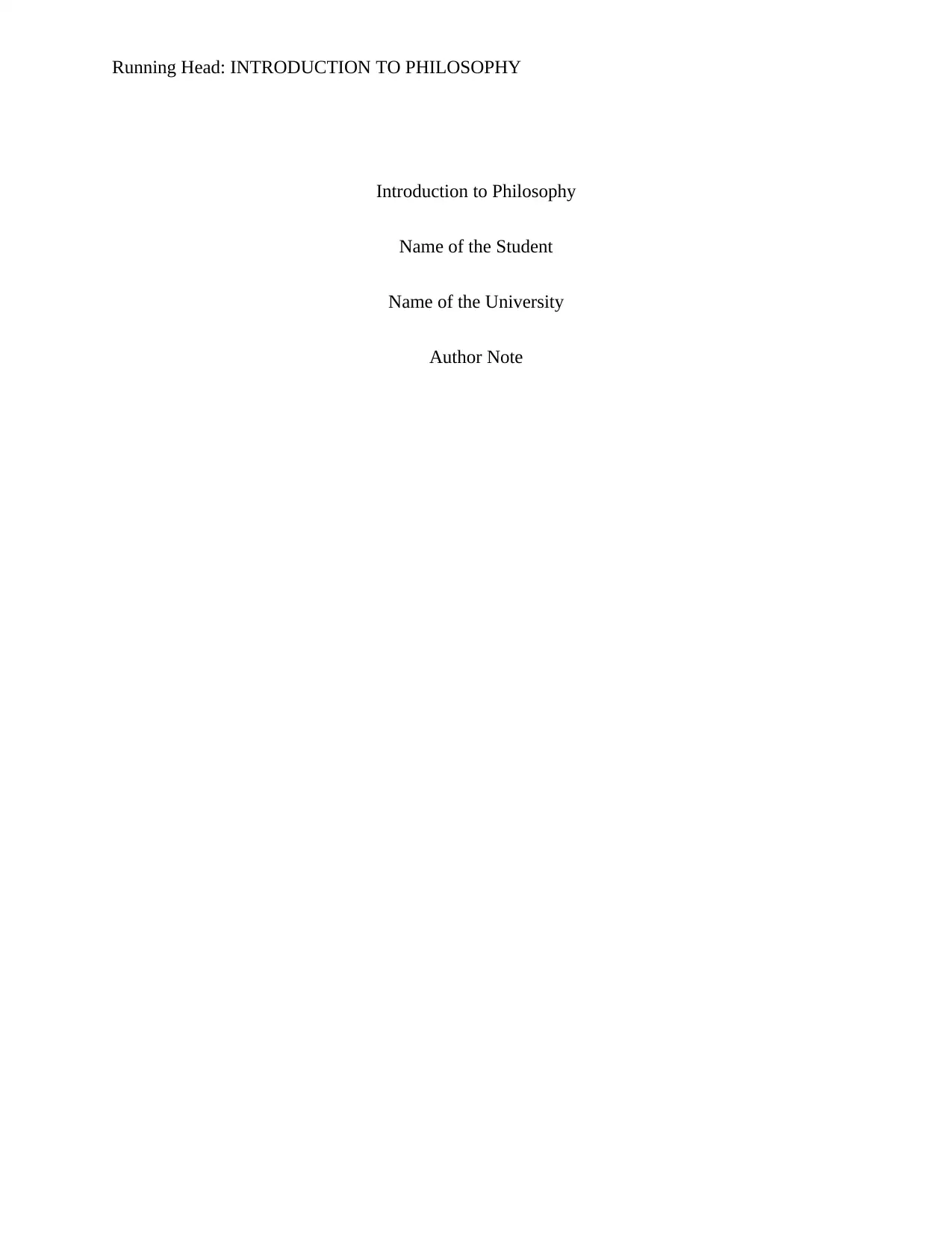
Running Head: INTRODUCTION TO PHILOSOPHY
Introduction to Philosophy
Name of the Student
Name of the University
Author Note
Introduction to Philosophy
Name of the Student
Name of the University
Author Note
Paraphrase This Document
Need a fresh take? Get an instant paraphrase of this document with our AI Paraphraser
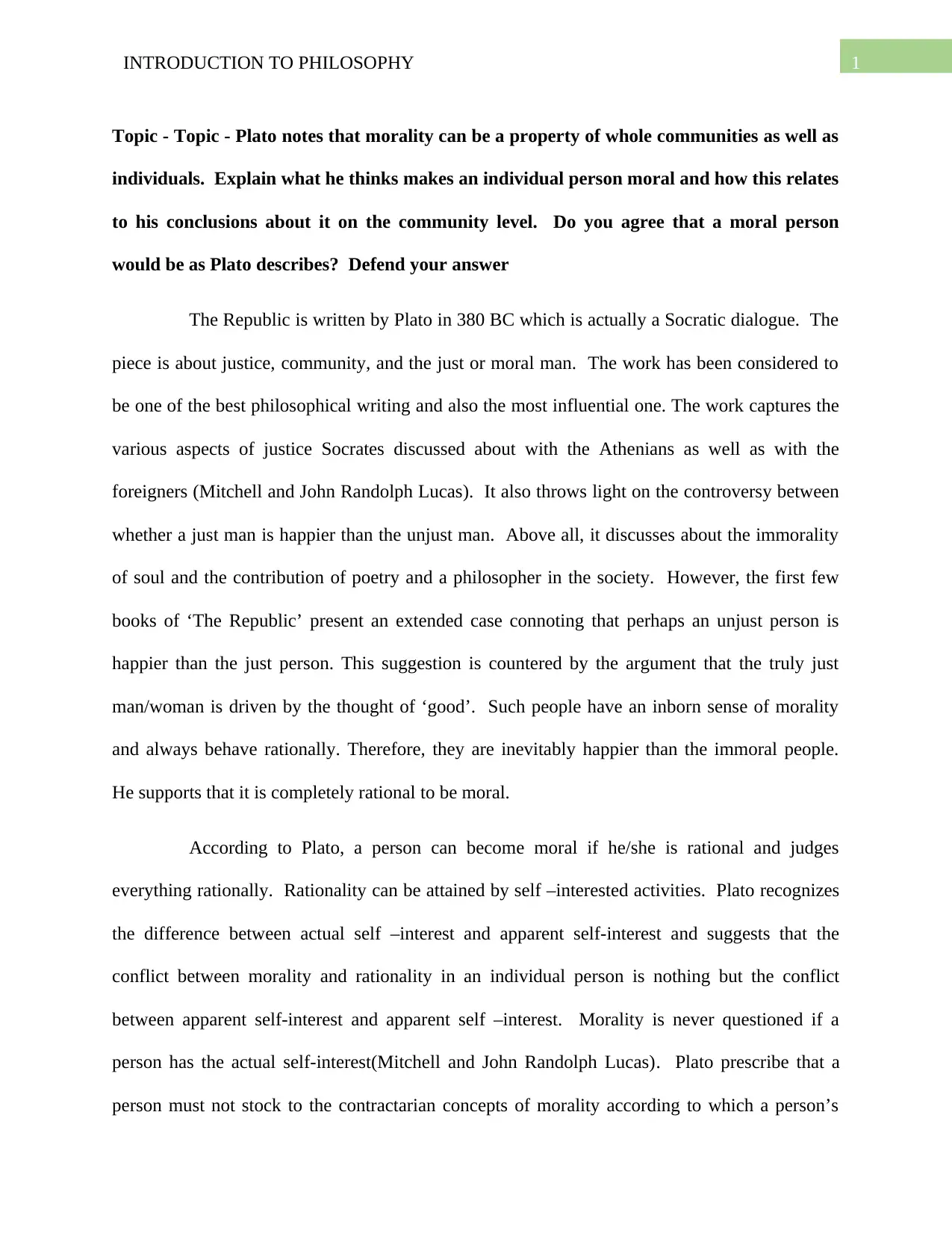
1INTRODUCTION TO PHILOSOPHY
Topic - Topic - Plato notes that morality can be a property of whole communities as well as
individuals. Explain what he thinks makes an individual person moral and how this relates
to his conclusions about it on the community level. Do you agree that a moral person
would be as Plato describes? Defend your answer
The Republic is written by Plato in 380 BC which is actually a Socratic dialogue. The
piece is about justice, community, and the just or moral man. The work has been considered to
be one of the best philosophical writing and also the most influential one. The work captures the
various aspects of justice Socrates discussed about with the Athenians as well as with the
foreigners (Mitchell and John Randolph Lucas). It also throws light on the controversy between
whether a just man is happier than the unjust man. Above all, it discusses about the immorality
of soul and the contribution of poetry and a philosopher in the society. However, the first few
books of ‘The Republic’ present an extended case connoting that perhaps an unjust person is
happier than the just person. This suggestion is countered by the argument that the truly just
man/woman is driven by the thought of ‘good’. Such people have an inborn sense of morality
and always behave rationally. Therefore, they are inevitably happier than the immoral people.
He supports that it is completely rational to be moral.
According to Plato, a person can become moral if he/she is rational and judges
everything rationally. Rationality can be attained by self –interested activities. Plato recognizes
the difference between actual self –interest and apparent self-interest and suggests that the
conflict between morality and rationality in an individual person is nothing but the conflict
between apparent self-interest and apparent self –interest. Morality is never questioned if a
person has the actual self-interest(Mitchell and John Randolph Lucas). Plato prescribe that a
person must not stock to the contractarian concepts of morality according to which a person’s
Topic - Topic - Plato notes that morality can be a property of whole communities as well as
individuals. Explain what he thinks makes an individual person moral and how this relates
to his conclusions about it on the community level. Do you agree that a moral person
would be as Plato describes? Defend your answer
The Republic is written by Plato in 380 BC which is actually a Socratic dialogue. The
piece is about justice, community, and the just or moral man. The work has been considered to
be one of the best philosophical writing and also the most influential one. The work captures the
various aspects of justice Socrates discussed about with the Athenians as well as with the
foreigners (Mitchell and John Randolph Lucas). It also throws light on the controversy between
whether a just man is happier than the unjust man. Above all, it discusses about the immorality
of soul and the contribution of poetry and a philosopher in the society. However, the first few
books of ‘The Republic’ present an extended case connoting that perhaps an unjust person is
happier than the just person. This suggestion is countered by the argument that the truly just
man/woman is driven by the thought of ‘good’. Such people have an inborn sense of morality
and always behave rationally. Therefore, they are inevitably happier than the immoral people.
He supports that it is completely rational to be moral.
According to Plato, a person can become moral if he/she is rational and judges
everything rationally. Rationality can be attained by self –interested activities. Plato recognizes
the difference between actual self –interest and apparent self-interest and suggests that the
conflict between morality and rationality in an individual person is nothing but the conflict
between apparent self-interest and apparent self –interest. Morality is never questioned if a
person has the actual self-interest(Mitchell and John Randolph Lucas). Plato prescribe that a
person must not stock to the contractarian concepts of morality according to which a person’s
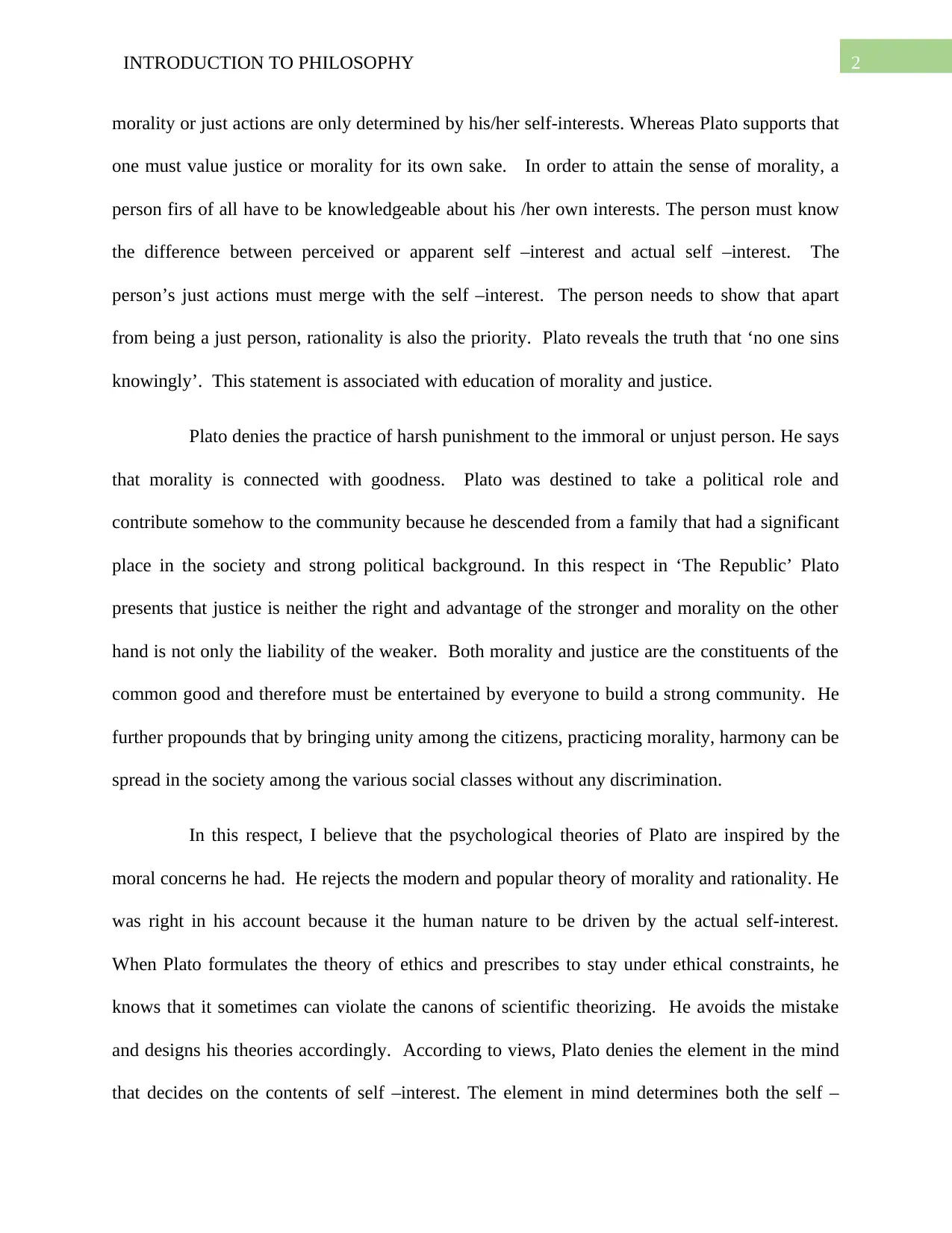
2INTRODUCTION TO PHILOSOPHY
morality or just actions are only determined by his/her self-interests. Whereas Plato supports that
one must value justice or morality for its own sake. In order to attain the sense of morality, a
person firs of all have to be knowledgeable about his /her own interests. The person must know
the difference between perceived or apparent self –interest and actual self –interest. The
person’s just actions must merge with the self –interest. The person needs to show that apart
from being a just person, rationality is also the priority. Plato reveals the truth that ‘no one sins
knowingly’. This statement is associated with education of morality and justice.
Plato denies the practice of harsh punishment to the immoral or unjust person. He says
that morality is connected with goodness. Plato was destined to take a political role and
contribute somehow to the community because he descended from a family that had a significant
place in the society and strong political background. In this respect in ‘The Republic’ Plato
presents that justice is neither the right and advantage of the stronger and morality on the other
hand is not only the liability of the weaker. Both morality and justice are the constituents of the
common good and therefore must be entertained by everyone to build a strong community. He
further propounds that by bringing unity among the citizens, practicing morality, harmony can be
spread in the society among the various social classes without any discrimination.
In this respect, I believe that the psychological theories of Plato are inspired by the
moral concerns he had. He rejects the modern and popular theory of morality and rationality. He
was right in his account because it the human nature to be driven by the actual self-interest.
When Plato formulates the theory of ethics and prescribes to stay under ethical constraints, he
knows that it sometimes can violate the canons of scientific theorizing. He avoids the mistake
and designs his theories accordingly. According to views, Plato denies the element in the mind
that decides on the contents of self –interest. The element in mind determines both the self –
morality or just actions are only determined by his/her self-interests. Whereas Plato supports that
one must value justice or morality for its own sake. In order to attain the sense of morality, a
person firs of all have to be knowledgeable about his /her own interests. The person must know
the difference between perceived or apparent self –interest and actual self –interest. The
person’s just actions must merge with the self –interest. The person needs to show that apart
from being a just person, rationality is also the priority. Plato reveals the truth that ‘no one sins
knowingly’. This statement is associated with education of morality and justice.
Plato denies the practice of harsh punishment to the immoral or unjust person. He says
that morality is connected with goodness. Plato was destined to take a political role and
contribute somehow to the community because he descended from a family that had a significant
place in the society and strong political background. In this respect in ‘The Republic’ Plato
presents that justice is neither the right and advantage of the stronger and morality on the other
hand is not only the liability of the weaker. Both morality and justice are the constituents of the
common good and therefore must be entertained by everyone to build a strong community. He
further propounds that by bringing unity among the citizens, practicing morality, harmony can be
spread in the society among the various social classes without any discrimination.
In this respect, I believe that the psychological theories of Plato are inspired by the
moral concerns he had. He rejects the modern and popular theory of morality and rationality. He
was right in his account because it the human nature to be driven by the actual self-interest.
When Plato formulates the theory of ethics and prescribes to stay under ethical constraints, he
knows that it sometimes can violate the canons of scientific theorizing. He avoids the mistake
and designs his theories accordingly. According to views, Plato denies the element in the mind
that decides on the contents of self –interest. The element in mind determines both the self –
⊘ This is a preview!⊘
Do you want full access?
Subscribe today to unlock all pages.

Trusted by 1+ million students worldwide
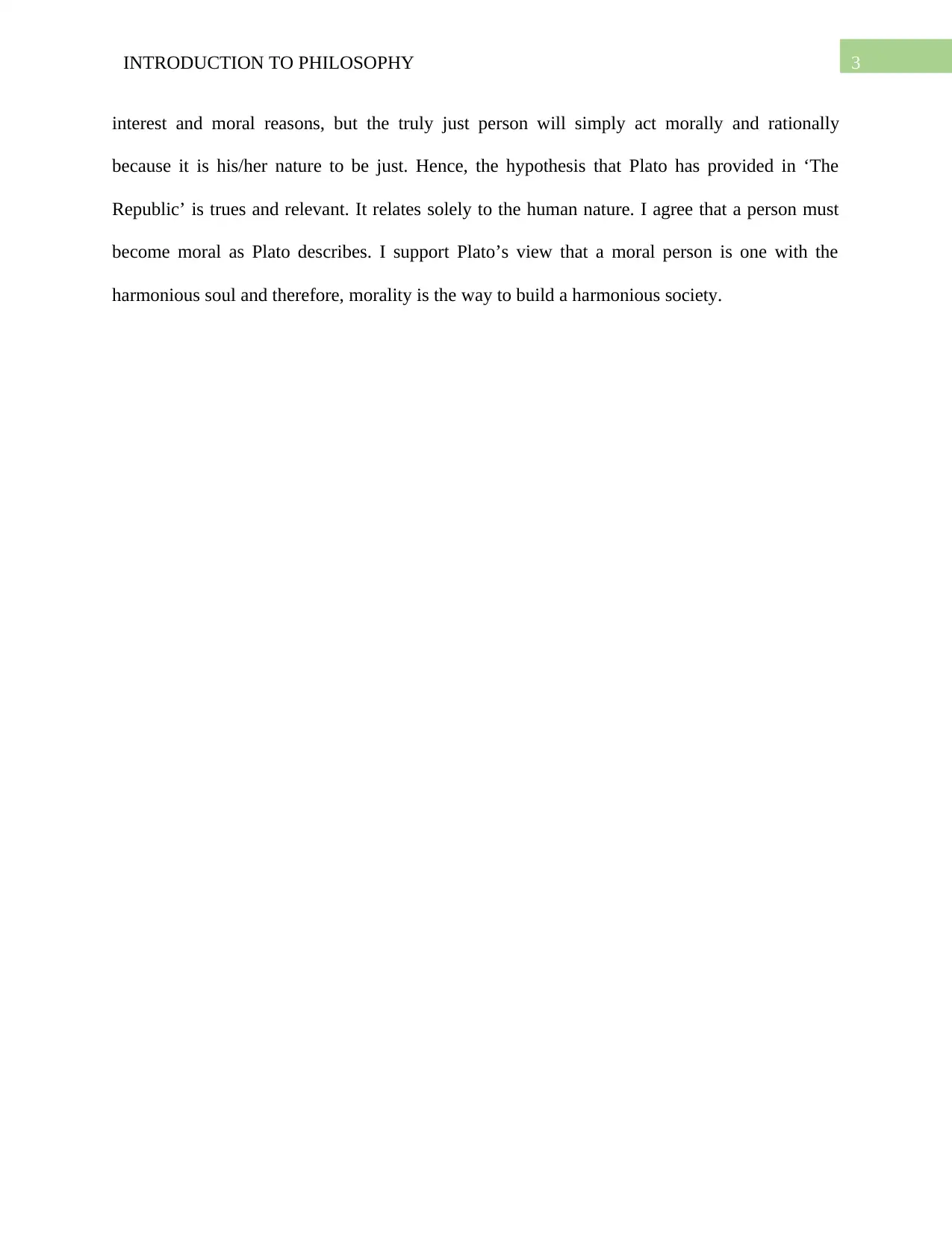
3INTRODUCTION TO PHILOSOPHY
interest and moral reasons, but the truly just person will simply act morally and rationally
because it is his/her nature to be just. Hence, the hypothesis that Plato has provided in ‘The
Republic’ is trues and relevant. It relates solely to the human nature. I agree that a person must
become moral as Plato describes. I support Plato’s view that a moral person is one with the
harmonious soul and therefore, morality is the way to build a harmonious society.
interest and moral reasons, but the truly just person will simply act morally and rationally
because it is his/her nature to be just. Hence, the hypothesis that Plato has provided in ‘The
Republic’ is trues and relevant. It relates solely to the human nature. I agree that a person must
become moral as Plato describes. I support Plato’s view that a moral person is one with the
harmonious soul and therefore, morality is the way to build a harmonious society.
Paraphrase This Document
Need a fresh take? Get an instant paraphrase of this document with our AI Paraphraser
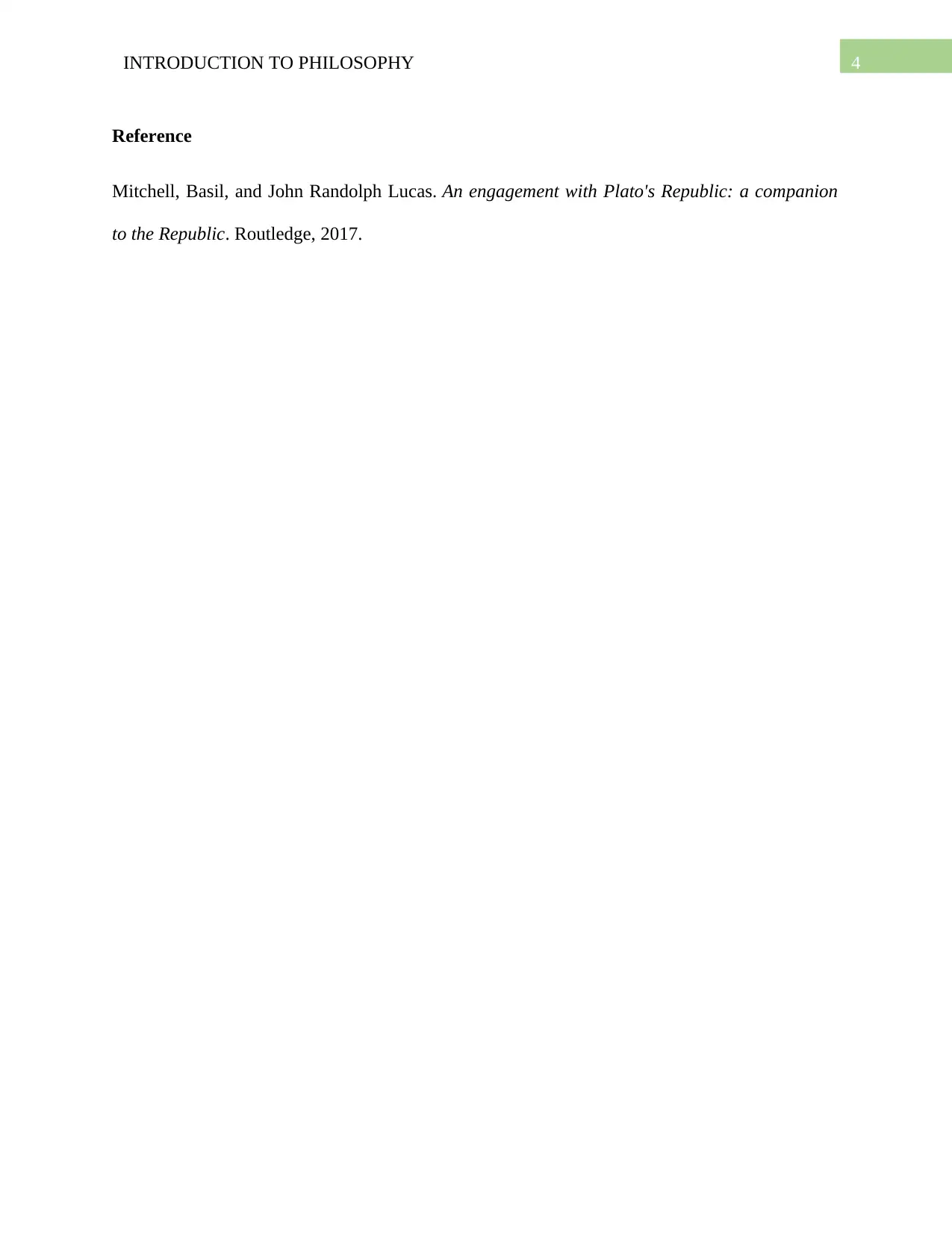
4INTRODUCTION TO PHILOSOPHY
Reference
Mitchell, Basil, and John Randolph Lucas. An engagement with Plato's Republic: a companion
to the Republic. Routledge, 2017.
Reference
Mitchell, Basil, and John Randolph Lucas. An engagement with Plato's Republic: a companion
to the Republic. Routledge, 2017.
1 out of 5
Related Documents
Your All-in-One AI-Powered Toolkit for Academic Success.
+13062052269
info@desklib.com
Available 24*7 on WhatsApp / Email
![[object Object]](/_next/static/media/star-bottom.7253800d.svg)
Unlock your academic potential
Copyright © 2020–2026 A2Z Services. All Rights Reserved. Developed and managed by ZUCOL.




